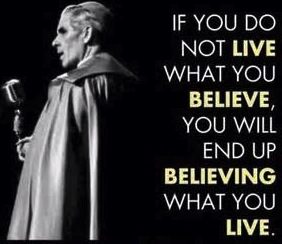Readings for Saturday (morning) of the Fourth Week in Advent: 2 Samuel 7:1-5, 8-12, 14, 16; Psalms 89; Luke 1:67-79
" . . . to give light to those who sit in darkness . . . " Luke 1:79
Today is the last day of Advent before we celebrate the Solemnity of the Nativity tonight and tomorrow. We end the Advent season with Zechariah's prophecy after the birth of John the Baptist and the coming birth of Christ. Last Christmas Eve, I wrote a reflection on Zechariah's beautiful words that I thought I would share here again. I hope and pray that in some small way, my reflections over the past four weeks have brought you closer to our Lord and Savior. May His light shine on you and your family this Christmas. Merry Christmas Eve, and God love you.
I'm often amazed how Sacred Scripture speaks to us in new and different ways each time we read it, even if it is a passage we are familiar with or have read countless times before. I had this experience recently when reading St. Luke's account of the birth of John the Baptist. (Luke 1:57-80) Recall that the angel Gabriel had visited John's father, Zechariah, to announce to him that his wife, Elizabeth--advanced in years and no longer able to have children--would bear a son "filled with the Holy Spirit" to "make ready a people prepared for the Lord." (Luke 1:5-17) But Zechariah did not believe the angel's words, and therefore was struck mute until John's birth. (Luke 1:18-20)
Eight days after Elizabeth gave birth to John, they took him to the temple to be circumcised. (Luke 1:59) After writing on a tablet that the baby would be named John, immediately Zechariah's "mouth was opened and his tongue loosened." (Luke 1:64) He then speaks what we now call the "canticle of Zechariah," prophesying about the coming Messiah and John's role in preparing His way. The following passage repeatedly jumps off the page at me:
""[T]hrough the merciful compassion of our God . . . a dawning from on high will visit us, to shine light on those sitting in darkness and the shadow of death, and to guide our feet onto the path of peace." (Luke 1:78-79)
More beautiful or poignant words have never been spoken to foretell the ultimate event in all of human history--God becoming man and entering the world so as to die for our salvation. Only a God with unfathomable "merciful compassion" would humble himself to the point of taking human flesh and "become[] obedient to death, even death on a cross." (Philippians 2:8) But come He did on a cold December night almost 2015 years ago, splitting time into. Though He came as a helpless babe born in a cave, the dawning light he would shine on the world sitting in darkness could not be contained, allowing each of us the chance to become partaker's in God's divine nature. "God became a man so that following a man--something you are able to do--you might reach God, which was formerly impossible to you." (St. Augustine, Commentary on Psalm 134, 5)
As the song we often sing at Mass during Advent proclaims: "Rejoice! Rejoice! Emanuel shall come to thee O Israel." And rejoice we should, for He comes to each one of us to "guide our feet on the path of peace." The path that leads to true joy on this earth, and the path that leads us to everlasting life with Him. But we first must be willing to stand in His light and accept this great gift--bright and painful to our senses as it may at first be. The Son provides no illumination to those who prefer to remain in the darkness. Although standing in His light exposes our weakness, our sin, our humanity, it allows us to step out of the "shadow of death." Indeed, through Jesus, "[d]eath is swallowed up in victory. Where, O death, is your victory? Where, O death, is your sting?" (1 Corinthians 15:54-55)
If you are a parent, you know the indescribable joy you experience in watching your children open their gifts on Christmas morning. Consider then, for a moment, the joy God feels when one of his children opens, and accepts, the gift of His Son, and he or she allows His light to shine upon them. So, as Advent draws to a close, and we anxiously await the birth of our Lord tomorrow night, I pray that you will step out and fully bask in Jesus's shining light, and in so doing, become "the light of the world." (Matthew 5:14) I leave you with these words from Pope Emeritus Benedict XVI:
"God has done everything; he has done the impossible: he was made flesh. His all-powerful love has accomplished something which surpasses all human understanding: the Infinite has become a child, has entered the human family. And yet, this same God cannot enter my heart unless I open the door to him."

